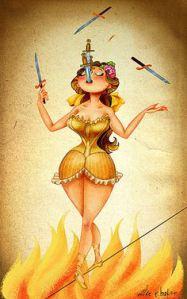The word career is a divisive word. It’s a word that divides the normal life from business or professional life. - Grace Paley
A couple of months ago I saw an article on a study which found that members of couples can probably tell when their partners are faking orgasm; it bore the provocative title “Your Partner Knows When You’re Faking”. My immediate reaction? “I’m a professional, Honey; maybe yours know, but mine don’t.” But that little joke set off a train of thought: isn’t it likely that one of the reasons so many women are anti-whore is that they’re intimidated by our superior sexual skills? To be sure, not every whore is a virtuoso in the bedroom; some get by on looks alone, or cater to unusual fetishes, or have incredible charm, and some just excel at marketing. But by and large, the average professional has both a greater range of skills and is better at each than the average amateur. Part of the reason is that we get a lot more practice, and part is necessity: except as noted above, we have to be better at it because our livelihoods depend on it.
 I don’t think I’m saying anything controversial here; the sexual proficiency of harlots is not really in dispute. Male commenters on this blog have often praised the abilities of their favorites, and our prowess underlies the myths depicting us as enchantresses, succubae and vampires. Insecure men fear that we will control them thus, and insecure women fear that we will steal their husbands (presumably to add to our collections); the whole “pimp” and “sex slave” mythology derives from the need to deny the legendary sexual powers of whores by pretending that we’re the pathetic, powerless victims of men. Nor are those women with enough sense to know that hookers really aren’t interested in their husbands wholly immune; many of them find the very idea that other women are better in bed than they are somewhat upsetting. Remember, society defines a woman by her sexuality to a far greater degree than it does a man: she is assigned to either the “Madonna” or “whore” category based upon it; selling sex is called “selling herself”, as though sex constituted her entire being; and sexual violation is supposed to utterly destroy her soul and irremediably pollute her body. Nor is it only traditional “patriarchal” thought which elevates female sexuality thus; neofeminists are simultaneously obsessed with it and defined by their rejection of it. So it’s not surprising that many women would be intimidated by the knowledge that others are better in the sack than they are; on some level, they see whores as better women than they are, and must reject that painful concept by imagining us as the exact opposite.
I don’t think I’m saying anything controversial here; the sexual proficiency of harlots is not really in dispute. Male commenters on this blog have often praised the abilities of their favorites, and our prowess underlies the myths depicting us as enchantresses, succubae and vampires. Insecure men fear that we will control them thus, and insecure women fear that we will steal their husbands (presumably to add to our collections); the whole “pimp” and “sex slave” mythology derives from the need to deny the legendary sexual powers of whores by pretending that we’re the pathetic, powerless victims of men. Nor are those women with enough sense to know that hookers really aren’t interested in their husbands wholly immune; many of them find the very idea that other women are better in bed than they are somewhat upsetting. Remember, society defines a woman by her sexuality to a far greater degree than it does a man: she is assigned to either the “Madonna” or “whore” category based upon it; selling sex is called “selling herself”, as though sex constituted her entire being; and sexual violation is supposed to utterly destroy her soul and irremediably pollute her body. Nor is it only traditional “patriarchal” thought which elevates female sexuality thus; neofeminists are simultaneously obsessed with it and defined by their rejection of it. So it’s not surprising that many women would be intimidated by the knowledge that others are better in the sack than they are; on some level, they see whores as better women than they are, and must reject that painful concept by imagining us as the exact opposite.
 Of course, this is all a load of nonsense. Sexual ability is a skill, no more or less valuable than many others; it isn’t magical, earth-shaking or ego-defining. Some people have a natural talent for it, and others don’t; some take the time to develop it, and others don’t; some earn their bread by it, and others don’t. Yes, I’m better at sex than most women; I’m also an above-average cook and (so I’m told) an excellent writer. My business skills, however, are below par; my housekeeping skills are mediocre at best and my musical ability is practically nonexistent. The fact that I possess the talents necessary to succeed as a professional sexual partner does not make me a better woman than someone who lacks those talents, but neither does it make me a worse one; each of us has her role to play, and society would have a lot fewer problems if each of us concentrated on her own rather than attempting to perform, critique or manage everyone else’s.
Of course, this is all a load of nonsense. Sexual ability is a skill, no more or less valuable than many others; it isn’t magical, earth-shaking or ego-defining. Some people have a natural talent for it, and others don’t; some take the time to develop it, and others don’t; some earn their bread by it, and others don’t. Yes, I’m better at sex than most women; I’m also an above-average cook and (so I’m told) an excellent writer. My business skills, however, are below par; my housekeeping skills are mediocre at best and my musical ability is practically nonexistent. The fact that I possess the talents necessary to succeed as a professional sexual partner does not make me a better woman than someone who lacks those talents, but neither does it make me a worse one; each of us has her role to play, and society would have a lot fewer problems if each of us concentrated on her own rather than attempting to perform, critique or manage everyone else’s.
